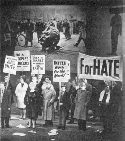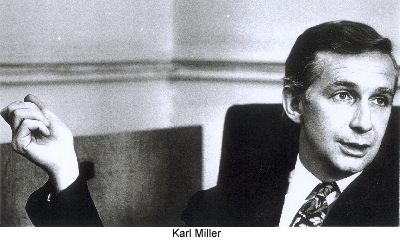
Mahagonny,
1963 |
David Drew
British writer, editor, music publisher, recording
producer
Annual Records 1959-63
USA (Weill/Lenya), New Statesman, BBC,
Eisler, Dessau, Mahagonny
|
|
| |
|
| 1959 |
D is now living in Balham
(South London) with Alexander Goehr and family (and will later move with
them to Willesden).
March: Appointed Music
Critic of The New Statesman and Nation, in succession to Desmond
Shawe-Taylor and William Glock. The Editor is Kingsley Martin, the arts section
is edited by Walter Allen. First two contributions are, respectively, an
article on Dallapiccola and a review of West Side Story. A record review
(Cherubini and Mendelssohn) and an article on Pfitzner's Palestrina
(with reference to Brecht's Galileo) follow. A similar pattern will be
preserved under Kingsley Martin's successor John Freeman (a keen supporter of
the Weill projects).
Spring: Discussions in
Frankfurt with Harry Buckwitz, Intendant of the Opera, concerning a suitable
triple bill centred on the German stage premiere in a year's time of Weill's
The Seven Deadly Sins. Royal Palace - D's first choice - being
impracticable at relatively short notice, the Kaiser one-act operas are chosen,
and D is commissioned to collaborate on the programme-book.
September: At the
Berlin Festival with O.W. Neighbour, chiefly to attend the Sellner
production of Schoenberg's Moses und Aron.
Autumn/early winter:
In New York and at Brook House with Lenya and Margarethe Kaiser
(the playwright's widow) continuing work on the Weill legacy, and writing the
doomed 'chapters' on the Broadway musicals.
First (of many) discussions
with Leonard Bernstein (Weill's Die Bürgschaft is one of the
topics).
|
| 1960 |
Together with Alexander
Goehr, joins William Glock's new team in the BBC's Music Department
at Yalding House - colleagues include Hans Keller, and later, Stephen
Plaistow. After a year, the attempt to combine producer-commitments for the
BBC with contributions to The New Statesman and work on the Weill
projects, proves unsustainable. The offer of a full-time BBC appointment is
regretfully declined (informal and formal links with the BBC continue for many
years).
Late March: In
Frankfurt for rehearsals of the Weill triple-bill and proofing the
programme-notes. First meeting with T.W. Adorno.
September: At the
Berlin Festival; discussions about Weill (and other matters) with
Hindemith and with Erwin Piscator. The Academy of Arts agrees
that the commissioned catalogue of the Weill legacy must be expanded to include
all the composer's traceable musical manuscripts - most of which are currently
held by Universal Edition. The discovery, by Helmut Wagner of UE, of the
complete files of Weill's correspondence with his publishers has profound
implications for the LIFE & WORKS. For the remainder of the
1960s, the task of writing and revising L&W, and the musical
and other researches connected with it, will be in strong competition with D's
other professional commitments.

|
| 1961 |
At The New Statesman a
new era begins with the appointment of Karl Miller as Editor of the Arts
Section - Miller is a slightly younger contemporary of D's. At the suggestion
of Stravinsky - who had read D's 1957 essay on French Music and sent the
author a note about it - Penguin Books commission an introductory essay to the
first paperback edition of Conversations with Igor Stravinsky,
and Memories and Commentaries (published as a Pelican Book in
1962 as Stravinsky in Conversation with Robert Craft).
The UK branch of the
Calouste Gulbenkian Foundation had been discussing with William Glock
and Martin Cooper the feasibility of sponsoring a series of commercial
recordings of contemporary music. Drew is engaged as advisor for the series,
and later becomes its Artistic Director. It will be marketed under the title
Music Today. The first releases will be on the EMI label. Drew's
collaboration with the Foundation - not only on recording projects - will
continue until he joins Boosey & Hawkes in 1975.
Attends British premiere of
the Deutsche Sinfonie by Hanns Eisler. The composer joins D and
Alexander Goehr at D's Fulham home - and is much amused that a wildcat
strike by electricity workers has plunged the house into almost total darkness
and removed any risk of being exposed to recordings of 'New Music'. Later,
Eisler arranges with the East German authorities the necessary (and generally
unobtainable) permissions and documents for a research-trip to the 'DDR' and to
Weill's birthplace in the city of Dessau.
Meeting in Paris with
Madeleine and Darius Milhaud.
|
| 1962 |
March: [?] Two days
in Dessau. First of two research visits to Lüdenscheid in West Germany.
16 May: At the 88th
session of the Royal Music Association, delivers a paper on Musical
Theatre in the Weimar Republic.
30 June: The death of
Caspar Neher puts an end to existing plans for the revision of Die
Bürgschaft.
Tunes in, by chance, to a
radio broadcast from Brussels of a large-scale oratorio but misses the opening
announcement. Astonished by its untoward character and sonority, listens to the
end, alternately fascinated and irritated, and learns that the composer is
Igor Markevitch. Hermann Scherchen had been conducting Le paradis
perdu on the occasion of the (former) composer's 50th birthday. An event
with consequences sixteen years later.
Publication:
Serielle Komponisten in England (Melos). Editorial
intrusions and problems with the translation necessitate an Afterword, which
Melos publish in English.
Collaborates with the opera
director Michael Geliot on an English version of Weill's opera
Aufstieg und Fall der Stadt Mahagonny for its forthcoming UK premiere by
the Sadlers Wells Opera (forerunner of English National Opera), conductor,
Colin Davis.
|
| 1963 |
March:
Geliot's production of Mahagonny, in his and D's English version, is
the first-ever outside German-speaking territories. Thanks above all to Colin
Davis, it is the first since 1945 to have sprung from a conviction that the
music is (at least) as important as the text. After the tryout at
Stratford-upon-Avon, the premiere at the Sadler's Wells's Theatre in London -
attended by Lotte Lenya and by Brecht's widow, Helene Weigel - attracts
phenomenal attention in the media. A key event in cultural history of the day,
the production also marks a new beginning for Weill-reception in the UK.
|
|

